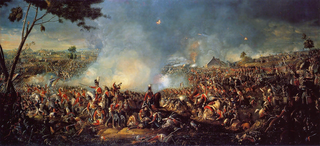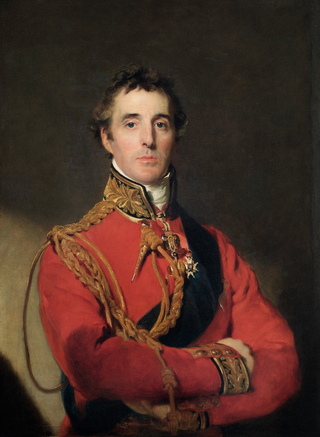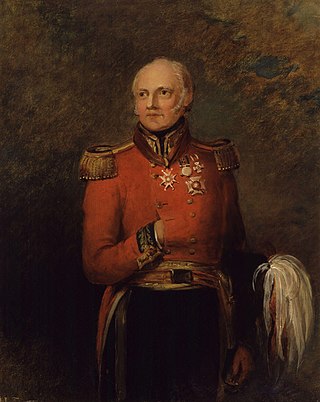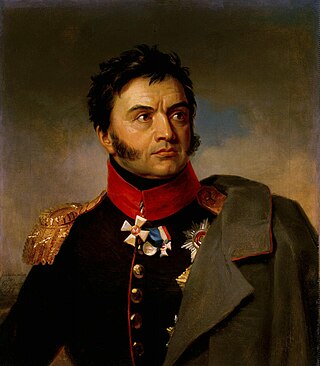Related Research Articles

The Battle of Waterloo was fought on Sunday 18 June 1815, near Waterloo, marking the end of the Napoleonic Wars. A French army under the command of Napoleon was defeated by two armies of the Seventh Coalition. One of these was a British-led force with units from the United Kingdom, the Netherlands, Hanover, Brunswick, and Nassau, under the command of the Duke of Wellington. The other comprised three corps of the Prussian army under Field Marshal von Blücher. The battle was known contemporarily as the Battle of Mont Saint-Jean in France or La Belle Alliance in Prussia.

Field Marshal Arthur Wellesley, 1st Duke of Wellington, was an Anglo-Irish statesman, soldier, and British Tory politician who was one of the leading military and political figures of 19th-century Britain, serving twice as prime minister of the United Kingdom. He is among the commanders who won and ended the Napoleonic Wars when the Seventh Coalition defeated Napoleon at the Battle of Waterloo in 1815.

The Napoleonic Wars (1803–1815) were a series of conflicts fought between the First French Empire under Napoleon (1804–1815), and a fluctuating array of European coalitions. The wars originated in political forces arising from the French Revolution (1789–1799) and from the French Revolutionary Wars (1792–1802): the War of the First Coalition (1792–1797) and the War of the Second Coalition (1798–1802), and produced a period of French domination over Continental Europe. There were seven Napoleonic Wars, five named after the coalitions that fought Napoleon, plus two named for their respective theatres: (i) the War of the Third Coalition (1803–1806), (ii) the War of the Fourth Coalition (1806–1807), (iii) the War of the Fifth Coalition (1809), (iv) the War of the Sixth Coalition (1813–1814), (v) the War of the Seventh Coalition (1815), (vi) the Peninsular War (1807–1814), and (vii) the French invasion of Russia (1812). The wars also produced several related conflicts, including the Gunboat War (1807-1814), the Finnish War (1808-1809), and the Anglo-Russian War (1807-1812).

André Masséna, Prince of Essling, Duke of Rivoli, was a French military commander during the French Revolutionary Wars and the Napoleonic Wars. He was one of the original 18 Marshals of the Empire created by Napoleon I. He was nicknamed l'Enfant chéri de la Victoire. He is often considered as one of the greatest generals of the Revolutionary and Napoleonic wars.

The Hundred Days, also known as the War of the Seventh Coalition, marked the period between Napoleon's return from eleven months of exile on the island of Elba to Paris on 20 March 1815 and the second restoration of King Louis XVIII on 8 July 1815. This period saw the War of the Seventh Coalition, and includes the Waterloo Campaign, the Neapolitan War as well as several other minor campaigns. The phrase les Cent Jours was first used by the prefect of Paris, Gaspard, comte de Chabrol, in his speech welcoming the king back to Paris on 8 July.

General Sir George Scovell, was a member of the quartermaster's staff of the British Army in Iberia during the Peninsular War.

General Sir Edward Paget was a British Army officer.

General Sir Robert Thomas Wilson was a British general and politician who served in Flanders, Egypt, the Iberian Peninsula, Prussia, and was seconded to the Imperial Russian Army in 1812. He sat as the Whig Member of Parliament (MP) for Southwark from 1818 to 1831. He served as the Governor of Gibraltar from 1842 until his death in 1849.

Nikolay Nikolayevich Raevsky was a Russian general and statesman who achieved fame for his feats of arms during the Napoleonic Wars. His family left a lasting legacy in Russian society and culture.
Lieutenant General Sir Geoffrey Charles Evans was a senior British Army officer during World War II and the post-war era. He was highly regarded as both a staff and field officer and had the distinction of being awarded the Distinguished Service Order (DSO) on three separate occasions.
Philip J. Haythornthwaite FRHistS is an author and historical consultant specialising in military history, uniforms, and equipment. While his main area of research is the Napoleonic Wars, his list of publications covers a wider period from the English Civil War through to 1939.
David Geoffrey Chandler was a British historian whose study focused on the Napoleonic era.

The military career of Napoleon Bonaparte spanned over 20 years. He led French armies in the French Revolutionary Wars and later, as emperor, in the Napoleonic Wars. Despite his rich war-winning record, Napoleon's military career ended in defeat. Napoleon has since been regarded as a military genius and one of the finest commanders in history. His wars and campaigns have been studied at military schools worldwide. He fought more than 80 battles, losing only eleven, mostly towards the end when the French army was not as dominant. The French dominion collapsed rapidly after the disastrous invasion of Russia in 1812. Napoleon was defeated in 1814 and exiled to the island of Elba, before returning and was finally defeated in 1815 at Waterloo. He spent his remaining days in British custody on the remote volcanic tropical island of Saint Helena.

The First French Empire, officially the French Republic, then the French Empire after 1809 and also known as Napoleonic France, was the empire ruled by Napoleon Bonaparte, who established French hegemony over much of continental Europe at the beginning of the 19th century. It lasted from 18 May 1804 to 3 May 1814 and again briefly from 20 March 1815 to 7 July 1815.

Claude Juste Alexandre Louis Legrand was a French general. He commanded French divisions at several notable battles of the French Revolutionary and Napoleonic Wars. Napoléon made him a Count of the Empire in 1808. He rose to senator on 5 April 1813, then Pair de France on 4 June 1814 and chevalier de Saint-Louis on 27 June 1814. He organised the defence of Chalon-sur-Saône in 1814 and died in Paris in 1815 of wounds received beside the River Berezina.
Digby Smith is a British military historian. The son of a British career soldier, he was born in Hampshire, England, but spent several years in India and Pakistan as a child and youth. As a "boy soldier", he entered training in the British Army at the age of 16. He was later commissioned in the Royal Corps of Signals, and held several postings with the British Army of the Rhine.

Arthur Wellesley, 1st Duke of Wellington,, was one of the leading British military and political figures of the 19th century. Often referred to solely as "The Duke of Wellington", he led a successful military career in the Indian subcontinent during the Fourth Anglo-Mysore War (1798–99) and the Second Anglo-Maratha War (1803–1805), and in Europe during the Napoleonic Wars (1803–1815).
Between 1793 and 1815, under the rule of King George III, the Kingdom of Great Britain was the most constant of France's enemies. Through its command of the sea, financial subsidies to allies on the European mainland, and active military intervention in the Peninsular War, Britain played the central role in Napoleon's downfall even as all the other major powers switched back and forth.
Alexander Mikaberidze is a Georgian lawyer, author and historian who specializes in Napoleonic studies. He is a full professor of history and social sciences at Louisiana State University in Shreveport, where he holds the Ruth Herring Noel Endowed Chair for the Curatorship of the James Smith Noel Collection, one of the largest private collections of antiquarian books, prints, and maps in the United States.